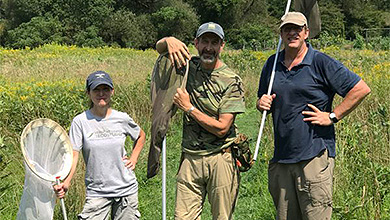Uniting people and science for conservation is not only VCE’s mission, it’s our passion. Browse our collection of VCE biologist-produced videos, webinars, and other multimedia offerings designed to help learners of all ages engage with the natural world.
Science Fairs
VCE science fairs provide a unique opportunity to hear our biologists discuss their current projects and engage them in lively discussion during Q&A sessions. Below, you will find recordings of past science fair events. Although the live Q&A may be over, you’re always welcome to reach out with questions!
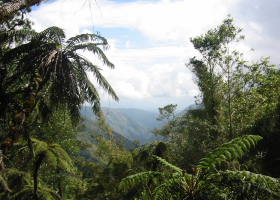
VCE Online Science Fair, March 2022
March 16, 2022Join us for an evening of VCE science exploration! In this 1-hour event, you will have the opportunity to meet in small groups with VCE biologists, spend 20 minutes learning about each of three active VCE projects and ask questions. Our March line-up featured Jason Hill (Conservation Biologist) and Abbie Castriotta (ECO AmeriCorps), Nathaniel Sharp (Staff Biologist and outreach naturalist), and Ryan Rebozo (Director of Conservation Science). Watch the recording »
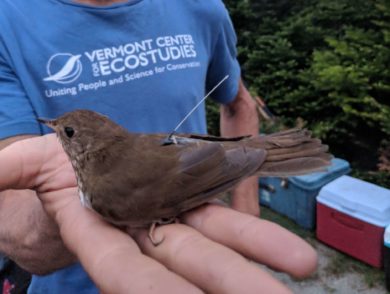
VCE Online Science Fair, February 2022
February 16, 2022Join us for an evening of VCE science exploration! At this event, our biologists discussed a new study that uses GPS tags to learn more about Bicknell's Thrush life cycle, the launch of VCE's first fairy shrimp survey, and the power community science data hold for predicting biodiversity in 2100. Watch the recording »
Conservation Coffee Hour
Conservation Coffee Hour was a limited-run webinar series scheduled for select Fridays on Zoom from February to April 2024. Each conversation provided opportunities for attendees to dive into some of VCE’s newest projects. Over the weeks, we covered topics ranging from ticks to pollinators, vernal pools to artificial intelligence, and much more.
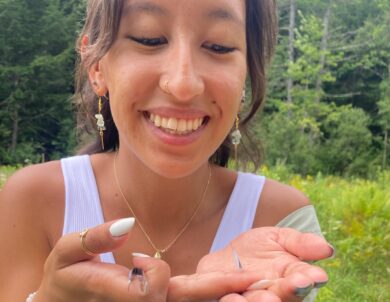
Conservation Coffee Hour: Future Ecologists Internship with Ryan Rebozo
Join us at 10 am to hear VCE Director of Conservation Science Ryan Rebozo share highlights from the first couple years of our Future Ecologists internship. VCE launched our Future Ecologists internship for aspiring ecologists underrepresented in the field of ecology. This internship provides an opportunity for two aspiring ecologists to join VCE in several research and conservation initiatives each summer. Watch the recording »
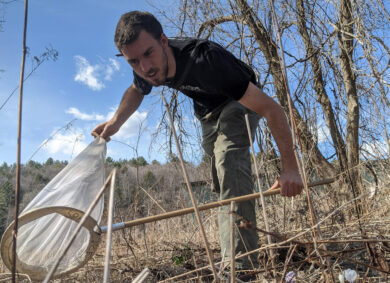
Conservation Coffee Hour: Vermont's Wild Bees with Spencer Hardy
Join Susan and VCE bee biologist Spencer Hardy at 10 am for insights into Vermont's bee diversity. Together, they will discuss key takeaways from the 2022 State of Vermont's Wild Bees report and explore its conservation impacts in Vermont and beyond. Watch the recording »
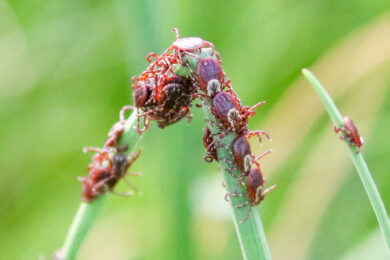
Conservation Coffee Hour: Backyard Tick Project with Jason Hill
VCE Conservation Biologist Jason Hill launched the Upper Valley Backyard Tick Project in 2023 to explore whether tick spraying has unintentional impacts on beneficial insect communities. Join the conversation at 10 am to hear takeaways from the first year of data collection and learn what you might be able to expect from this exciting, new project this summer. Watch the recording »
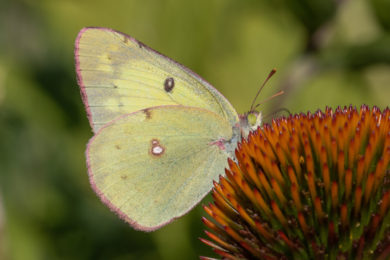
Conservation Coffee Hour: Changes in Wildlife Atlasing with Kent McFarland
For decades, wildlife atlasing has been a cornerstone of long-term biodiversity monitoring. Tune in at 10 am to hear VCE Conservation Biologist and Vermont Atlas of Life director Kent McFarland share his reflections on how atlasing has evolved over the years, discuss the second Vermont Butterfly Atlas, and offer thoughts on the upcoming third Vermont Breeding Bird Atlas. Watch the recording »
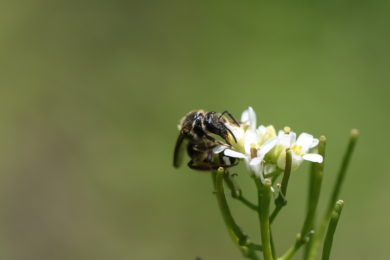
Conservation Coffee Hour: Native Plants and Pollinators with Desirée Narango
Now that spring has sprung, spend an hour getting excited about native plants and their pollinators. VCE Conservation Biologist Desirée Narango will share her extensive knowledge and delve into her research projects that center plant-pollinator interactions. Watch the recording »
Vernal Pools
Vernal pools are a unique type of wetland habitat. Each spring, rain and melting snow fill these small, shallow depressions on the land (think wicked big puddles). With no permanent inlet or outlet, the water very slowly dries up over the summer, preventing fish from taking up residence. This “ephemeral” nature of vernal pools makes them uniquely suited to support several species of animals that require these temporary wetland habitats for their very survival. Learn about vernal pool ecology and the charismatic critters that call them home in this collection of videos and webinars.
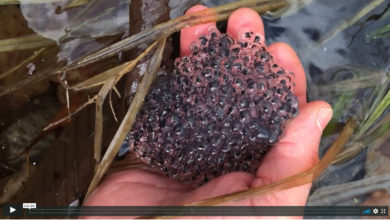
Watch a Vernal Pool Come to Life
Watch a vernal pool come to life in this video series. Each short (2-5 minute) video reveals a different aspect of the natural history and ecology of these fascinating, keystone ecosystems. VCE Conservation Biologist Steve Faccio visits a local vernal pool throughout the spring and summer of 2020. At each visit, he visually documents the changes with video clips and discusses what he finds. Go to the Vernal Pool Conservation Videos page »
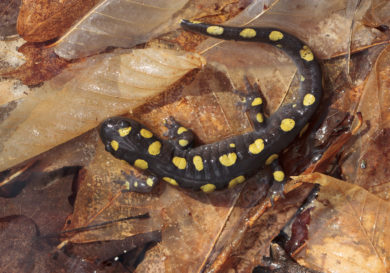
Recorded Webinar: Vernal Pools - Wicked Big Puddles or Critical Wildlife Habitat
In this webinar, VCE Conservation Biologist Steve Faccio focuses on the ecology of vernal pools with an emphasis on the wildlife (both amphibians and invertebrates) that depend upon them to complete their life cycles. You'll learn about the characteristics of vernal pools and why ecologists consider them to be “keystone ecosystems.” The webinar also feature a demonstration of VCE’s new Vermont Vernal Pool Atlas, an online database and interactive mapping tool for vernal pools in Vermont. (Length: 1h 4m) Watch the recorded webinar »
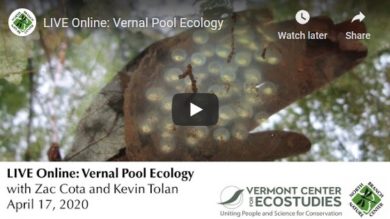
Recorded Webinar: Vernal Pool Ecology with VCE and North Branch Nature Center
These seasonal, woodland ponds harbor the greatest collections of biomass in the northern forest. Learn about life in a vernal pool from the perspective of everything from salamanders and frogs to fairy shrimp and predaceous diving beetles. Presented by NBNC’s Zac Cota, and the Vermont Center for Ecostudies’ Kevin Tolan. (Length: 1h 13m) Watch the recorded webinar »
The World of Bees, Lady Beetles, and Other Insects
Did you know there are over 300 species of wild bees in Vermont? And that 14 out of 34 Vermont lady beetle species haven’t been seen for decades? There are far more questions than answers when it comes to understanding the status of the insect biodiversity all around us. These video offerings will set you on a path of mystery and discovery in the diminutive world of insects.
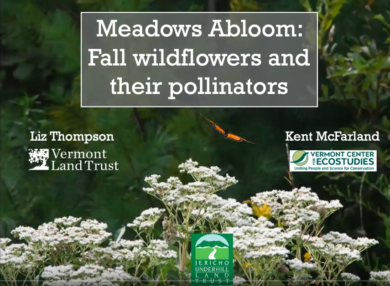
Recorded Webinar - Meadows Abloom: Fall Wildflowers & Their Pollinators
Join Liz Thompson of Vermont Land Trust and VCE's Kent McFarland to learn about the fascinating interplay between late-summer flowers and insects, and get tips for making your own yard more pollinator-friendly! This super-informative presentation is packed with gorgeous photos - you won't want to miss it! Watch the webinar »
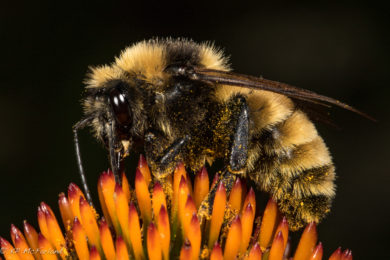
Recorded Webinar: Bumble Bee Natural History and Conservation in Vermont
VCE conservation biologist Kent McFarland presents the natural history and conservation status of the bumble bee species known to Vermont, highlighting results of the Vermont Bumble Bee Atlas, in this introductory lecture for the Salisbury, VT Conservation Commission. (Length: 1h 21m) Learn something new about bumble bees »
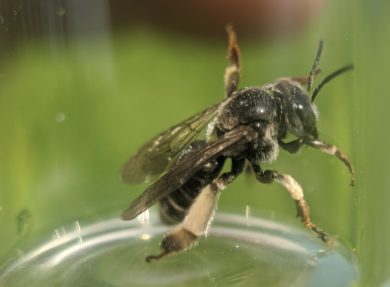
Macropis Hunting
Join Spencer Hardy, VCE's Vermont Wild Bee Survey Coordinator, in the field as he searches for rare bees in Williston. Learn more about VCE's Vermont Wild Bee Survey at http://val.vtecostudies.org/projects/vtbees. (Photo: A female Oil-collecting Bee (Macropis) / © Spencer Hardy) (Length: 3m 22s) See what he finds... »
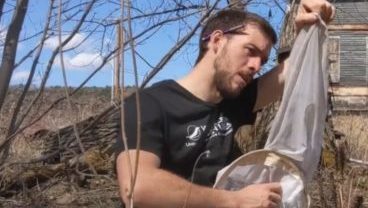
April Bees
Spencer Hardy, VCE's Vermont Wild Bee Survey Project Coordinator, is on the hunt for the first wild bees of the year. Learn more about VCE's Vermont Wild Bee Survey at http://val.vtecostudies.org/projects/vtbees. (Length: 2m 46s) Watch Spencer catch a wild bee »
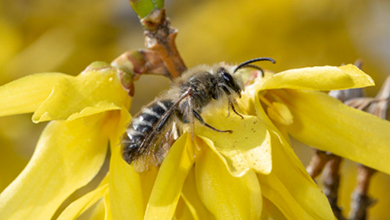
Recorded Webinar: Bee Conservation in Vermont
Join Spencer Hardy to learn about Vermont's bee species, facts about bee life, and VCE's Vermont Wild Bee Survey. You're guaranteed to find yourself thinking, "I didn't know that about bees!" during this presentation. (Length: 32m 36s) Learn about wild bees »
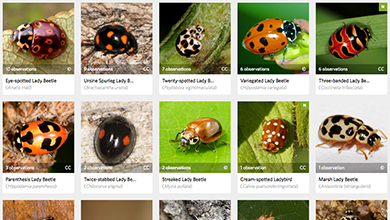
Recorded Webinar: Help Us Find Vermont's Missing Lady Beetles
Did you know that 14 of Vermont's 34 Lady Beetle species are missing? Learn about these fascinating beetles and how you can help us discover every species in the state! (Length: 1h 2m) Watch the webinar »
Everything Birds
VCE conducts several bird research and monitoring projects – Mountain Birdwatch, Vermont Loon Conservation Project, Grassland Bird Conservation, Forest Bird Monitoring Program, Eastern Whip-poor-will Project, Mountain Songbird Research and Conservation, and Caribbean Forest Bird Research and Conservation. Plus, we really like birdwatching. Here you’ll find an assortment of videos and webinars about our feathered friends from all corners of the Western Hemisphere.
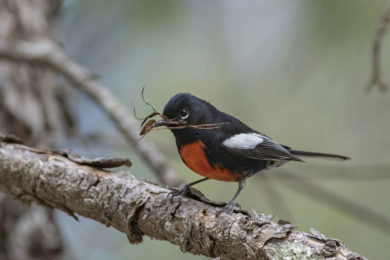
Recorded Webinar: Birds of Southeast Arizona - A Virtual Tour
Let the sights and sounds of warmer, drier climes take you on a virtual vacation from mud season here in the Northeast! An experienced bird guide, Jared Keyes will lead us on a multimedia tour of some of Southeast Arizona’s special places and special birds. The unique habitats in this corner of the Desert Southwest host an extraordinary variety of avian life. Turn up the volume and run the video in full screen mode for the best viewing experience! (Length: 1h 16m 51s) Watch the recorded webinar »
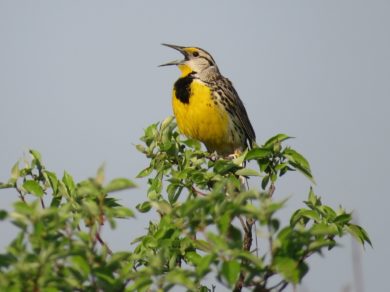
Recorded Webinar: Green Mountain Meadowlarks
Eastern Meadowlarks in the Northeast are rapidly declining; based on the latest USGS Breeding Bird Survey results, they’re undergoing an estimated 8.7% annual decline in Vermont. With their recent designation of Threatened in New Hampshire, and imminent listing in Vermont, now is a golden opportunity for targeted survey efforts. VCE is partnering up with New Hampshire Audubon to launch a bi-state “blitz” this spring to encourage birders and community scientists to target areas of grassland habitat with the goal of seeking out meadowlarks. Learn about these imperiled songbirds and what you can do to help keep them on the Vermont landscape. (Length: 1h 21m 55s) Watch the recorded webinar »
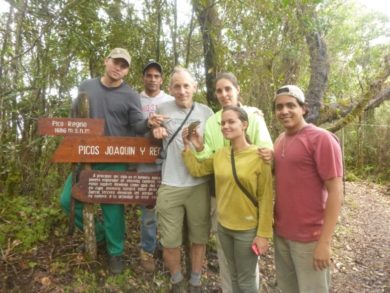
Recorded Webinar: On the Trail of Bicknell’s Thrush in Cuba
Cuba is an important refuge for overwintering Bicknell's Thrush, as one of only four Greater Antillean islands that support the species' entire global population in winter. Since 2017, Chris Rimmer and colleagues at VCE have explored remote high-mountain forests in eastern Cuba in search of this rare, elusive, and globally vulnerable songbird. During this webinar, Chris tells the story of VCE's efforts to elucidate the status of Bicknell's Thrush on Cuba, including arduous field work in areas that may never before have been visited by humans. His illustrated presentation not only recounts the fascinating natural history and annual cycle challenges of Bicknell's Thrush, but highlights Cuba's remarkable ecological diversity and wonderfully warm people. (Length: 58m 35s) Watch the recorded webinar »
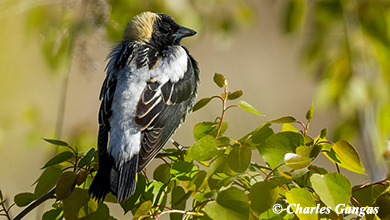
Recorded Webinar: Grassland Bird Ecology and Conservation
Join VCE's Grassland Bird Outreach team, Liza Morse and Kevin Tolan, for this program about grassland birds in Vermont. Grassland birds are undergoing the most drastic decline of any bird community in the continental U.S. Learn about the ecology and natural history of the predominant grassland breeding bird species in Vermont: Bobolinks, Savannah Sparrows, and Eastern Meadowlarks. (Length: 1h 8m) Watch the recorded webinar »
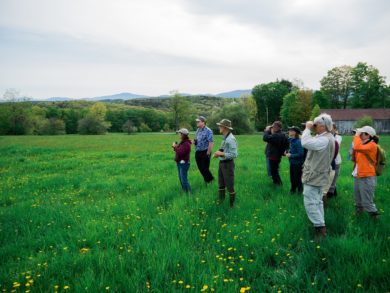
Recorded Workshop: Managing Grasslands for Birds
VCE's Grassland Bird Outreach Team, Liza Morse and Kevin Tolan, and Vermont Land Trust's Pieter van Loon hosted this virtual workshop about grassland bird ecology and habitat management for landowners. Grassland birds are undergoing the most drastic decline of any bird community in the continental United States. Being informed about grassland habitat management will help landowners with fields or pastures of 10 acres or more to become grassland bird conservationists. (Length: 1h 16m) Watch the recorded workshop »
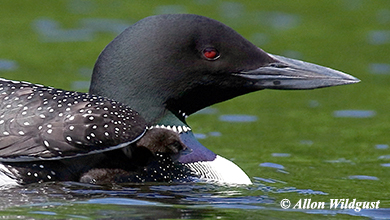
Recorded Webinar: Loon Behavior and Stories from the Field
You are guaranteed to learn something you didn't know about loons in this webinar! VCE loon biologist Eric Hanson packed this presentation with beautiful slides and stories from the field. (Length: 1h) Watch the webinar »
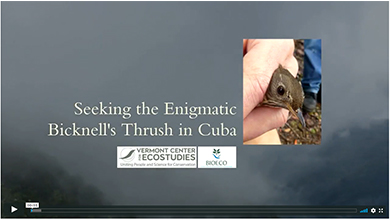
Seeking the Enigmatic Bicknell's Thrush in Cuba
In January 2018, VCE's Chris Rimmer and colleagues from the Cuban science institute BIOECO led a field survey of Bicknell's Thrush on its wintering grounds in the remote mountains of Parque Nacional Pico Turquino in eastern Cuba. Join the crew as they navigate wet, high-elevation trails in search of this avian needle in a haystack. (Length: 12m 19s) Experience the sights and sounds of the Cuban cloud forest »
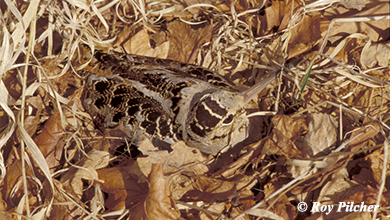
American Woodcock
Ever hear of a timberdoodle, a Labrador twister, a night partridge, or a bog sucker? These are all names for the American Woodcock (Scolopax minor), a crepuscular bird belonging to the sandpiper family. Male woodcock display in early spring in open areas or "singing grounds," spiraling upwards to a height of two-hundred to three-hundred feet. In this video, listen for the sounds of the male's antics as he puts on an evening performance for some lucky female. (Length: 1m 30s) Go timberdoodlin' with Liza »
Climate Change
Here you’ll find webinars and videos presented by VCE staff and collaborators on the effects of climate change on wildlife habitats and life histories.
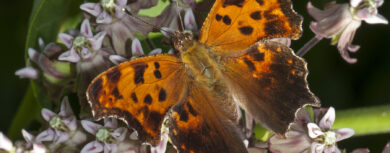
VAL 10th Anniversary Report
June 14, 2023Vermonters have risen to the conservation challenge: our community scientists lead the nation with more field observations per capita than any other state. We use nearly 8 million observations from almost 12,000 species reported from across the state to help establish a biodiversity baseline for Vermont, critical for understanding and measuring biodiversity changes in the future caused by landscape and climate change. Watch the recording »
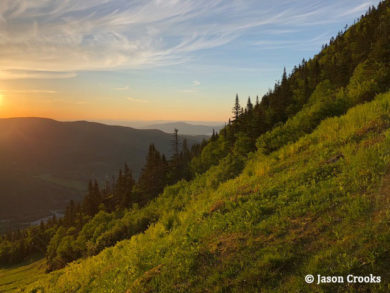
Recorded Webinar: What Does the Future Hold for New England's Mountains?
You can never hike the same mountain twice—it is constantly changing. As global climate change continues to alter New England’s temperature and precipitation regimes, we will see additional changes in the distribution and abundance of flora and fauna that call our region home. These changes will be especially noticeable in the mountains, which are warming at twice the rate of the rest of the world. Join VCE biologist Jason Hill to learn about the future of our New England Mountains. Gain insights from VCE’s Mountain Birdwatch program about how montane bird communities are already changing, and learn about some proposed strategies (e.g., assisted colonization) for what plant and wildlife conservation might look like in the near future. (50m) Watch the webinar »
Community Science Tools
Did you know that you don’t need a background in science to be a Community Scientist? From backyards and bogs to mountains and meadows, you’ll find many ways to get involved and make a real contribution to wildlife conservation. If you’d rather not muck around a swamp or hike to a summit, you can still volunteer for VCE – even from the comfort of home. Explore your options to participate in VCE science on our Volunteer page!
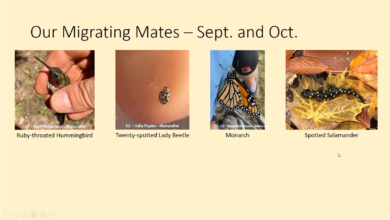
Recorded Webinars: Lunchtime Learning Series
This showcase contains video recordings from Lunchtime Learning sessions hosted by VCE's Community Science Outreach Naturalist, Julia Pupko. Each week, Julia presents tips for using iNaturalist to it's fullest, along with a Vermont natural history topic that is pertinent to the current season. Watch the series »
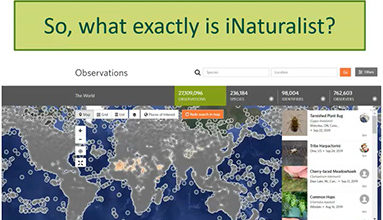
Recorded Webinar: Learn How to Use iNaturalist to Become a Citizen Scientist
What is iNaturalist? It's an app. It's a community. It's a powerful learning tool. And it's so much more! Learn how to use iNaturalist to identify species, increase your biodiversity knowledge, or to get ready to participate in a BioBlitz near you. iNaturalist is a great tool for exploring the natural world. Presented by VCE's Citizen Science Outreach Naturalist, Emily Anderson. (Length: 1h) Watch the iNaturalist webinar »
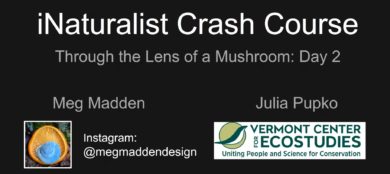
Recorded Webinar: iNaturalist Crash Course: Through the Lens of a Mushroom
In this two-part workshop series, VCE Community Science Outreach Naturalist Julia Pupko and VT-Based Fungi Expert Meg Madden provide an overview of iNaturalist use, fungi photography for ID purposes, and fungi ID. On Day 1, Julia and Meg provide an overview of iNaturalist - what it is, what features it has, and how to use iNaturalist. Additionally, Meg provides information on how to ID fungi and take high-quality photographs that iNaturalist AI and naturalist users can identify (Length: 1.5 hours). On Day 2, details are provided on the connection between iNaturalist and research, along with an in-depth description of how to use the Identify feature in iNaturalist, create Places, and set up Projects (Length: 1.5 hours). Watch both recordings here »
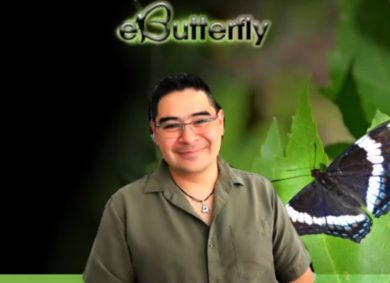
Recorded Webinar: How to eButterfly
Take a tour of eButterfly (Length: 1 hour). Watch the recording »
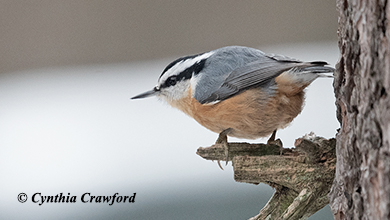
Recorded Webinar: Backyard Birding with eBird
What can you do with eBird? Keep track of your bird lists, photos, and sounds; explore the latest sightings from around the world; contribute to science and conservation; and more! Learn how to use eBird and join the world's largest birding community. If you don't have an eBird account yet, visit Vermont eBird at https://ebird.org/vt/home to sign up and get the app. (Length: 44m 20s) Watch the webinar »
Listen and Learn
Here you’ll find audio-only selections for your listening (and learning) pleasure.
